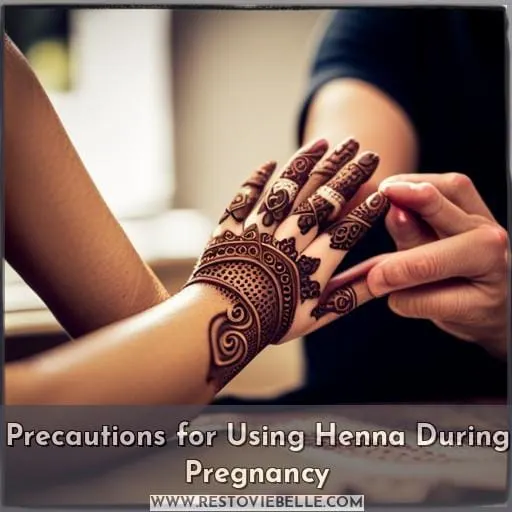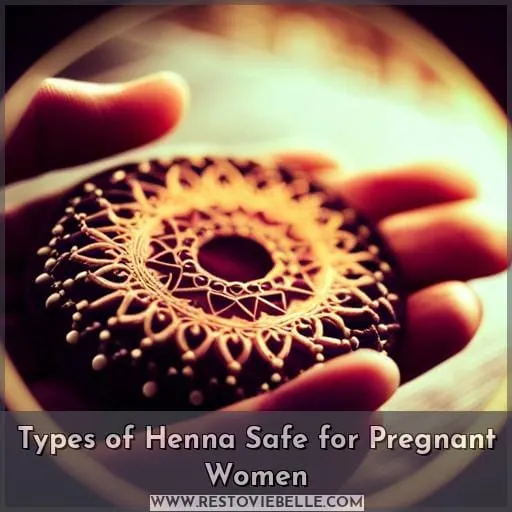This site is supported by our readers. We may earn a commission, at no cost to you, if you purchase through links.
 Are you pregnant and considering coloring your hair? Many women worry about the safety of using chemical dyes on their hair while they are expecting. If that’s the case for you, why not explore natural alternatives like henna? In this article, we’ll discuss if it is safe to use henna during pregnancy – benefits as well as potential risks.
Are you pregnant and considering coloring your hair? Many women worry about the safety of using chemical dyes on their hair while they are expecting. If that’s the case for you, why not explore natural alternatives like henna? In this article, we’ll discuss if it is safe to use henna during pregnancy – benefits as well as potential risks.
We will also provide tips to help ensure a safe application process when can I henna my hair while pregnant.
Table Of Contents
- Key Takeaways
- Is Henna Safe to Use During Pregnancy?
- Benefits of Using Henna During Pregnancy
- Precautions for Using Henna During Pregnancy
- Types of Henna Safe for Pregnant Women
- Using Henna for Coloring Hair During Pregnancy
- Applying Henna on the Skin During Pregnancy
- Potential Risks of Using Black Henna During Pregnancy
- Tips for Safe Henna Application During Pregnancy
- When to Seek Medical Help After Henna Application
- Conclusion
Key Takeaways
- Read product labels for 100% natural henna and choose high-quality henna from reputable brands.
- Avoid black henna containing PPD as it can cause allergies and dermatitis.
- Perform a patch test 24 hours prior to henna application and always wear gloves during application.
- Consider alternatives like highlighting or vegetable-based dyes and consult with a doctor before using henna during pregnancy.
Is Henna Safe to Use During Pregnancy?
You may safely color your locks with natural, pure henna during pregnancy as long as you follow safety tips and consult a doctor if needed. Natural brown henna is safe for hair and skin application during pregnancy. However, black henna, which contains PPD (paraphenylenediamine), can cause dermatitis, blisters, and allergies, posing a risk to both the mother and baby.
When applying henna on the skin, including the belly area, or scalp, it is important to read product labels carefully to ensure it is 100% natural-based.
Henna has cooling benefits that help reduce body heat in pregnant women. However, it is important to avoid overheating the room when using this dyeing method too often.
For highlighting techniques, it is advisable to seek professional advice from hairdressers. This technique reduces the risks of chemicals being absorbed by the scalp or bloodstream, as compared to simple dying processes.
Lastly, it is crucial to wear gloves at all times during the application process. Additionally, minimizing dye application time and rinsing off after each session properly can ensure maximum safety assurance.
Benefits of Using Henna During Pregnancy
Are you considering using henna for your hair and skin during pregnancy? Natural henna is generally safe to use, providing numerous benefits such as cooling the body, healing cracked heels, treating fungal infections, and nourishing nails.
However, it’s important to take certain precautions when applying henna during this special time.
Safety of natural henna
When it comes to using natural henna while pregnant, it’s best to err on the side of caution and go with the flow. Natural henna has many benefits, such as cooling the skin, healing cracked heels, treating fungal infections, and nourishing nails.
To ensure safety, make sure to read product labels and choose authentic products that don’t contain black henna. Black henna can cause dermatitis or blisters, so it’s important to avoid it. If you have any medical conditions, it’s always a good idea to check with your doctor before using henna.
To safely apply henna, here are some tips to keep in mind. First, do a patch test 24 hours before applying henna to make sure you don’t have any adverse reactions. When applying henna, make sure to sit comfortably with support to avoid any discomfort.
It’s also important to avoid overheating rooms, as this can cause sweating and affect the henna’s effectiveness. After applying henna, it’s recommended to seek help when washing out hair dye to ensure thorough removal.
Lastly, don’t cover your hands after applying henna, as this can interfere with its cooling effect.
Benefits for hair and skin
Applying natural henna during pregnancy can bring a world of benefits for both your hair and skin. Its cooling effect helps to keep the body temperature down, while its antibacterial properties heal cracked heels or treat fungal infections.
Henna also nourishes nails and strengthens hair follicles. Ensure you use only pure, high-quality variants from reputable brands as chemically mixed henna may cause complications.
Precautions during application
Take extra care when using henna during pregnancy to ensure safe application. Follow these tips: 1) Read the product label; make sure it’s pure henna, free of chemicals like PPD. 2) Do a patch test 24 hours before applying on the skin or belly. 3) Work in a well-ventilated room at comfortable temperatures—avoid overheating! Be mindful of allergies and medical conditions too for your safety and the baby’s health.
Precautions for Using Henna During Pregnancy
Before taking the plunge and coloring your locks with henna, make sure to take certain precautions for a safe experience. Natural brown henna is generally considered safe for hair and skin during pregnancy, but seek advice from a professional if you’re considering belly henna or black chemical mix varieties.
Do patch tests 24 hours in advance to check sensitivity levels and avoid overheating rooms while using it. Read product labels thoroughly before application as some may contain harmful chemicals like PPD, which can cause dermatitis, blisters, or allergies.
Professional assistance is recommended when applying on large areas of skin. Use pillows or stools for comfort during long applications, then allow natural drying without covering hands afterwards as this will help cool down temperature.
Lastly, remember that all safety tips should be followed throughout your pregnancy, so consult with a doctor beforehand if you have any medical conditions before using henna at all!
Types of Henna Safe for Pregnant Women
You can safely henna your hair during pregnancy, as long as you’re aware of the types available and take the necessary precautions. Natural henna is a safe choice for pregnant women and provides many benefits. It can cool down body temperatures, heal cracked heels, treat fungal infections, and nourish nails.
On the other hand, black henna contains harmful chemicals such as Paraphenylenediamine (PPD), which may cause dermatitis or blisters due to allergies.
Here’s what you should keep in mind when using natural henna:
- Read product labels carefully to ensure that it’s authentic natural henna.
- Do a patch test 24 hours before applying it on your face or belly.
- Be cautious while applying it with a baby bump present.
- Avoid overheating the room during the application time.
Apart from these precautions, seek medical advice if you have any underlying medical conditions prior to using henna.
Using Henna for Coloring Hair During Pregnancy
When coloring your hair during pregnancy, natural henna is a great option that’s both safe and nourishing. It’s derived from the henna plant and can be used on skin as well as the scalp for hair dyeing.
With its cooling effects, it helps soothe itching due to pregnancy hormones. What’s more, it has beauty benefits like treating fungal infections in feet or nails – something pregnant women may suffer from.
Before applying henna onto your belly or hands, though, do read product labels carefully to ensure you’re getting pure natural ingredients without any added chemicals like PPD, which could cause blisters and irritate the skin when applied to a baby bump.
A patch test 24 hours before use is also advisable if you have sensitive skin prone to allergies. Otherwise, seek the help of professionals who know exactly how best to apply the paste with ease while avoiding exertion of heavy movements, such as scrubbing off dried clumps after the application time elapses.
Finally, always remember that consulting medical help if discomfort arises post-application will keep both mother and child healthy through their journey together.
Applying Henna on the Skin During Pregnancy
Rather than using chemical hair dyes, consider adorning your skin with natural henna for a cooling effect and nourishment. Natural henna from the plant is safe to use during pregnancy as long as you take certain precautions.
Read product labels carefully to make sure it’s true natural henna without any added chemicals like PPD, which can cause dermatitis, blisters, and allergies.
Do a patch test on your skin 24 hours before applying it all over just in case you have an allergic reaction or get irritated by essential oils used while preparing the paste. Be cautious when applying near or around the baby bump. Sit comfortably with pillows or stools under your feet if needed so that no extra exertion takes place during the application process.
Henna has other benefits too, such as healing cracked heels, treating fungal infections, and nourishing nails. It also gives a refreshing feeling due to its cooling properties once applied to the skin.
However, avoid covering your hands after application unless advised otherwise by a doctor or specialist. Air exposure helps maintain the coolness of body temperature, which is helpful during pregnancy.
Potential Risks of Using Black Henna During Pregnancy
Although the use of natural henna is generally safe during pregnancy, it’s important to be aware of potential risks associated with black henna. These can include allergic reactions and skin sensitivity due to high amounts of hair dye chemicals such as PPD (paraphenylenediamine).
Using this type of artificial dye on pregnant women could result in dermatitis, blisters, or other unwanted side effects. It is illegal for skin applications in some countries like the UK, so caution should always be taken when using any type if you are expecting.
To reduce these dangers while still maintaining a sense of beauty and style during pregnancy, there are alternatives that can provide similar benefits without risking your health or safety. For example, you can consider highlighting instead of coloring completely or opting for vegetable-based dyes.
It is also recommended to conduct a patch test 24 hours before applying any product onto your scalp or body, wear gloves while handling products containing harsh ingredients, work in well-ventilated rooms, and rinse off immediately after the application time has expired.
By following these precautions carefully, you will greatly reduce the risk associated with using hair dyes while pregnant, giving both mother and baby peace of mind!
Tips for Safe Henna Application During Pregnancy
To ensure a safe experience, follow these key tips when applying henna during pregnancy. Natural henna is the safest form and won’t cause any harm or leave behind a black stain. Before using, do a patch test 24 hours in advance to avoid potential allergies or dermatitis caused by PPD found in chemical mix hennas.
When applying on the skin or hair of pregnant women, it’s best to seek help from professionals and take precautions like wearing gloves while rinsing off the scalp after dye application. Additionally, keep the room well-ventilated for optimal safety and minimize dye application time as much as possible.
Highlighting hair also reduces the risk since chemicals are absorbed by the hair instead of entering the bloodstream directly through the scalp.
Lastly, make sure you’re only using high-quality pure natural henna that has been sourced from reputable brands.
When to Seek Medical Help After Henna Application
After henna application, it’s important to be aware of any skin reactions or allergies. Monitor for redness, itchiness, and other signs of irritation around the area that was applied. If you experience any discomfort or adverse reaction after using henna during pregnancy, seek medical help immediately from a trusted healthcare provider such as your obstetrician/gynecologist (OB-GYN) or dermatologist.
In particular, if you have had an allergic reaction to henna in the past before pregnancy, then speak with your doctor beforehand about its safety when pregnant. Additionally, consult a dermatologist if you are concerned about potential skin concerns related to using natural pure hennas on delicate areas, including hands and face, which may absorb more dye chemicals than hair strands do.
Remember that seeking professional medical advice is essential for both mother and baby’s health while expecting, so always ensure proper precautions are taken when considering safe options like pure natural hennas over chemical mix variants during pregnancy!
Conclusion
To sum up, henna is a safe, natural, and beneficial way for pregnant women to dye their hair and apply it to their skin. As long as pure, natural henna is used and safety precautions are taken, pregnant women can enjoy henna’s cooling effects, nourishing properties, and cultural symbolism.
However, black henna should be avoided due to its potentially harmful chemicals. Before applying henna, it’s wise to consult with a doctor and seek advice from an experienced hairdresser. Pregnant women should also do a patch test and use pillows or stools for support while getting henna applied.
Lastly, if any adverse reactions occur after henna application, seek immediate medical help.















